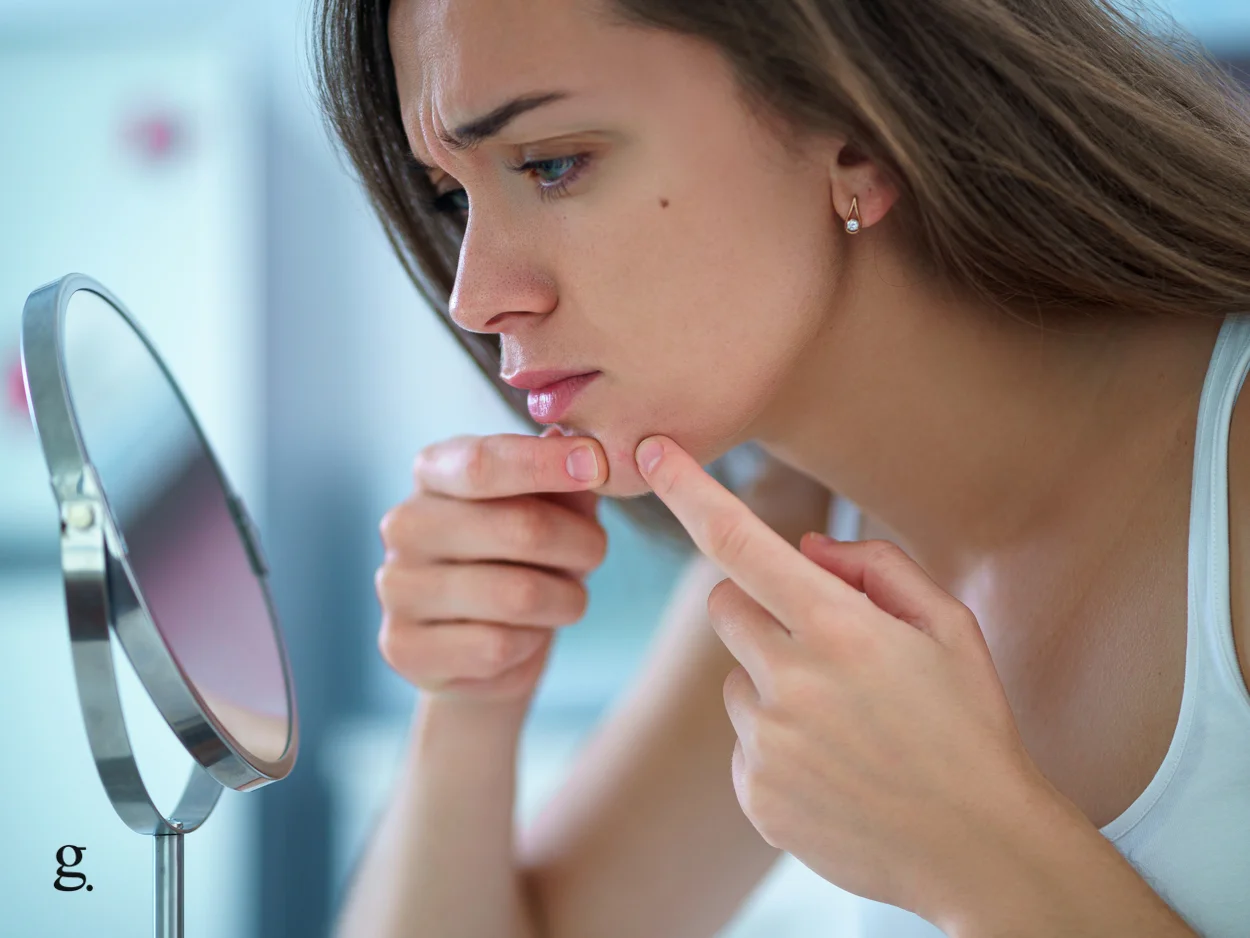Blind pimples, also known as cystic acne, can be a real pain in the you-know-what. They’re not your average zit, as they form deep under the skin and can be quite painful and difficult to deal with.
Blind pimples can occur anywhere on the body, but they are most commonly found on the face, neck, chest, and back. These areas have a higher density of oil glands, making them more prone to clogged pores and the formation of blind pimples.
What causes blind pimples to form under the skin?
Let’s dive into the nitty-gritty of blind pimples before you jump into the action plan. It’s essential to know what causes these little monsters to form under the skin in the first place. Blind pimples, unlike regular zits, don’t have a visible head and are typically more painful. These unwelcome visitors are the result of a few factors:
- Clogged pores: When excess oil, dead skin cells, and other impurities clog the pores, it creates an ideal environment for acne-causing bacteria to thrive. The clogged pore then becomes inflamed, leading to the formation of a blind pimple.
- Hormonal fluctuations: Hormonal changes, especially during puberty, menstruation, or pregnancy, can cause an increase in oil production, leading to clogged pores and the formation of blind pimples. That’s right, hormones can be a real party pooper.
- Stress: Ever noticed how breakouts seem to happen right when you’re stressed out? It’s not a coincidence. Stress causes the body to produce more cortisol, a hormone that increases oil production, making the skin more acne-prone.
- Diet: Consuming high-glycemic foods, like sugary treats or refined carbs, can cause blood sugar levels to spike, which in turn triggers inflammation and increased oil production. The result? A higher likelihood of blind pimples making an appearance.
Alright, now that you’re well-versed in the causes of blind pimples, it’s time to explore the most effective ways to give them the boot. Keep in mind that patience is key when dealing with blind pimples, as they might take a bit longer to heal than your average zit. Here are some tried-and-true methods for treating blind pimples:
1. Warm compresses
Applying a warm compress to the affected area can be a game-changer when it comes to soothing inflammation and reducing swelling of blind pimples. To create a warm compress, soak a clean washcloth in warm (not hot) water, wring it out, and gently press it onto the blind pimple for about 10-15 minutes.
Doing this a couple of times a day can help bring the pimple closer to the surface, encouraging it to come to a head and heal faster. Plus, it’s a relaxing and comforting way to pamper your skin.
2. Topical Spot treatments
Over-the-counter spot treatments containing active ingredients like salicylic acid, benzoyl peroxide, or sulfur are your secret weapons against blind pimples. Salicylic acid is a powerful exfoliant that unclogs pores, benzoyl peroxide targets acne-causing bacteria, and sulfur helps dry out the pimple.
To make the most of these treatments, apply a small amount directly to the blind pimple and let it work its magic overnight or throughout the day. Be sure to follow the product instructions and avoid overusing, as it could cause irritation or dryness.
3. Ice, ice, baby
When you want to calm the inflammation and reduce the redness of a blind pimple, ice is your best friend. Wrap an ice pack, a bag of frozen peas, or even a few ice cubes in a clean cloth, and gently press it against the blind pimple for a few minutes at a time. Repeat this process every few hours, as needed.
The cold temperature will help constrict blood vessels, reducing inflammation and redness. Just remember not to apply ice directly to the skin, as it could cause damage or frostbite.
4. Tea tree oil
Tea tree oil is a natural powerhouse with antibacterial and anti-inflammatory properties that can be a lifesaver for acne-prone skin. To use tea tree oil on a blind pimple, mix a few drops with carrier oil (like jojoba oil or coconut oil) to dilute it. Apply the mixture directly to the blind pimple using a cotton swab or a clean fingertip.
Make sure to do a patch test on a small area of skin first to ensure you don’t have an adverse reaction, as pure tea tree oil can be quite potent and potentially irritating.
Don’t squeeze or pick
This one’s non-negotiable. No matter how tempting it may be, resist the urge to squeeze or pick at a blind pimple. Doing so can cause the infection to spread deeper into the skin or even to other areas, leading to more pimples, scarring, or even an infection. Remember, slow and steady wins the race—let the pimple heal on its own while using the other methods mentioned above to speed up the process.
Understanding Reoccurring Blind Pimples
Dealing with recurring blind pimples can be incredibly frustrating, but understanding why they keep coming back is key to putting an end to this annoying cycle. Here are some factors that might contribute to the recurrence of blind pimples:
- Hormonal fluctuations: As mentioned earlier, hormonal changes during puberty, menstruation, pregnancy, or even due to certain medications can lead to an increase in oil production, making your skin more susceptible to blind pimples. Keep track of when your breakouts occur to see if there’s a pattern related to your hormonal cycle.
- Inadequate skincare routine: If you’re not cleansing your skin properly or using the right products for your skin type, excess oil and impurities can build up, leading to blind pimples. Make sure to cleanse your face twice a day, exfoliate gently a few times a week, and use skincare products tailored to your skin’s needs.
- Diet and lifestyle: Consuming a diet high in sugar, refined carbs, or dairy can contribute to inflammation and increased oil production, making your skin more prone to blind pimples. Try incorporating more whole foods, fruits, and vegetables into your diet, and don’t forget to drink plenty of water. Regular exercise and proper sleep can also help keep your skin in tip-top shape.
- Overuse of skincare products: While it’s essential to use acne-fighting products, overdoing it can actually make the situation worse. Using too many active ingredients or over-exfoliating can irritate the skin and disrupt its natural barrier, leading to more blind pimples. Stick to a balanced skincare routine and avoid overloading your skin with harsh ingredients.
- Underlying skin condition: If you’re consistently experiencing blind pimples despite a proper skincare routine and a healthy lifestyle, there might be an underlying skin condition at play. Conditions like polycystic ovary syndrome (PCOS) or an imbalance in the skin’s microbiome can contribute to recurring acne. In such cases, it’s best to consult a dermatologist for personalized advice and treatment.
Blind Pimple Home Remedies
Sometimes, you might want to tackle blind pimples with natural remedies you can whip up at home. While home remedies may not be as potent as over-the-counter treatments, they can still provide some relief and help speed up the healing process. Here are a few home remedies to try:
- Apple cider vinegar: This kitchen staple has antibacterial and anti-inflammatory properties that can help soothe blind pimples. Dilute one part apple cider vinegar with three parts water, and apply the mixture to the affected area using a cotton swab. Leave it on for about 15-20 minutes before rinsing off. Be sure to patch test first, as some people may find apple cider vinegar irritating.
- Honey: Known for its antibacterial and wound-healing properties, honey can be a sweet treat for your skin. Apply a small amount of raw honey directly to the blind pimple, and let it sit for about 30 minutes before rinsing off with warm water. Bonus: honey is also a natural humectant, meaning it helps lock in moisture, keeping your skin hydrated.
- Aloe vera: Aloe vera has long been used for its anti-inflammatory and soothing properties, making it a popular remedy for various skin concerns. Apply a thin layer of pure aloe vera gel to the blind pimple, and let it absorb into the skin. Aloe vera can help reduce redness and inflammation while promoting healing.
- Green tea: Rich in antioxidants and anti-inflammatory compounds, green tea can be a helpful ally in the fight against blind pimples. Brew a cup of green tea, allow it to cool, and then soak a cotton pad in the tea. Apply the soaked cotton pad to the affected area and let it sit for about 15-20 minutes before rinsing off.
- Turmeric: This golden spice has potent anti-inflammatory and antibacterial properties that can help calm blind pimples. Mix a small amount of turmeric powder with water or honey to create a paste, and apply it to the blind pimple. Leave it on for about 15-20 minutes before rinsing off. Be aware that turmeric can temporarily stain the skin, so use it with caution.
Remember, while these home remedies can provide some relief, they might not be as effective as conventional acne treatments.
Conclusion
Dealing with blind pimples can be a challenge, but it’s not impossible. By understanding the causes and factors that contribute to their formation, you can take steps to prevent and treat them effectively.
Whether you choose over-the-counter treatments, home remedies, or a combination of both, remember that patience and consistency are key. If you’re struggling with recurring blind pimples despite your best efforts, it might be time to consult a dermatologist for professional guidance.
Keep your chin up and your skincare routine on point, and you’ll be well on your way to conquering those pesky blind pimples once and for all!

